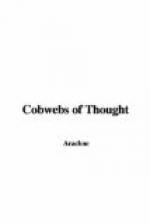Spiritualists and Theosophists talk of a Dominant Self, and an Astral body, and of gleams of heavensent insight. Gleams of insight and dreams do come to us, and teach us truths, which “never can be proved,” and without some such intuitions the soul of man would indeed be poor,
The soul that rises with us, our life’s
star,
Hath had elsewhere its setting,
And cometh from afar.
But the value of the intuitions is relative to the soul which has them; they cannot be conveyed to any one else, or demonstrated; they can never become Truths valid to all minds. And these last are the truths we want if we would make some orderly progress towards a given issue. And so we resort after all, to science, to see if it can solve the intellectual riddle of our being. What can it do for us? If we would really know ourselves, we want a depth of self-analysis; not a pitiful search for motives, not the superficial probings of a moralist, not the boundless, limitless, self-absorbed speculations on the nature of self of the philosopher, not the sympathetic noting of each emotion that crosses the horizon of the soul—the introspection of the Poet; these will never teach us the reason why we think and feel on certain lines, and not on others—these will never explain to us what the mind is, that is in us—what that strange thing is, which we have tried so vainly to understand. And without this knowledge how worthless is the work of the moralist; of what practical use is it for him to endeavour to alter a man’s character, when he does not even know the ingredients that constitute character, still less the cause why character is good or bad. Mr. Robert Buchanan said in one of his essays: “I can advance no scientific knowledge for seeing a great genius in Robert Browning, or a fine painstaking talent in George Eliot, for thinking George Meredith almost alone in his power of expressing personal passion, and Walt Whitman supreme in his power of conveying




